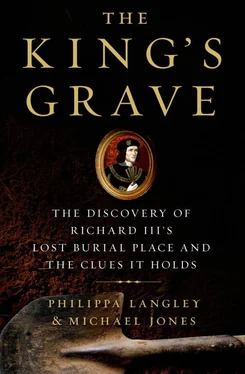On Richard’s courage, and his final moments in battle, the provisional ideas of Bob Woosnam-Savage are from ‘The Violent Death of the King in the Car Park’, a talk given at the Royal Armouries, Leeds, on 27 March 2013. For another who may have struck Richard In those final, terrible moments: Raymond Skinner, ‘Thomas Woodshawe, “Grassiour” and Regicide’, Ricardian, IX (1993). Rhys ap Thomas’s duel with Richard is recounted in the seventeenth-century family history: Ralph Griffiths, Sir Rhys ap Thomas and His Family: A Study in the Wars of the Roses and Early Tudor Politics (Cardiff, 1993).
The history attributed Richard’s death to Rhys himself, but it was one of his followers who almost certainly killed him. For the praise poem: Edward Rees, A Life of Guto’r Glyn (Aberwystwyth, 2008). Information on the Rhys ap Thomas bed has been kindly provided by Sioned Williams, Curator of Furniture at the National History Museum, Cardiff.
Chapter 11: The Man Behind the Myth
For the story of Thomas Redeheid see Paul Murray Kendall, Richard III (London, 1973) p. 136. For Richard’s sense of humour: from Leicester Castle, on 18 August 1483, Richard sent an important letter to the French king, Louis XI. The letter was carried by Richard’s groom of the stable: ‘I pray that by my servant, this bearer, a groom of my stable, you will let me know in writing your full intention…’ Kendall, Richard III, pp. 255–6.
For the letter to Chancellor Russell see Kendall, Richard III, p. 324. Kendall remarks on the generosity of the letter. For the full text of the poem see Andrew Breeze, ‘A Welsh Poem of 1485 on Richard III’, Ricardian, XVIII (2008), pp. 46–53.
For analysis indicating the Tudor instigation behind it, see Annette Carson, ‘Dafydd Llwyd’s Poem’, Ricardian Bulletin, autumn 2008, pp. 35–49.
Chapter 12: The Man and his Times
William Bracher, yeoman of the crown, owed his promotion to royal service through informing Richard of the uprising in the West Country in 1483: Calendar of Patent Rolls, 1476–85, pp. 373, 390 (grants of lands and offices in Devon, Somerset and Dorset for ‘good service against the rebels’). Catesby’s role as agent of Richard III in Brittany was crucial in precipitating Henry Tudor’s flight from the duchy at the end of September 1484: Cliff Davies, ‘Richard III, Brittany and Henry Tudor’, Nottingham Medieval Studies, 37 (1993).
For the revealing wording of Richard’s grant of an annuity to Saxton Church on 19 February 1484: Tim Sutherland and Armin Schmidt, ‘Towton 1461: An Integrated Approach to Battlefield Archaeology’, Landscapes, 4 (2003).
For Thomas Gregory’s pride in his service ‘cum Henrico Septimo apud Bosworth Field’, in the earliest use of the actual battle name: the Shakespeare Centre (Birthplace Trust), DR10/1349, a deed of 26 October 1500. Henry VII’s first parliament is described in Cavill, English Parliaments. Material on the Stanley-Harrington dispute is drawn from Michael Jones, ‘Richard III and the Stanleys’, in Richard III and the North, ed. Horrox. For the political climate of the time see Paul Strohm, Politique: The Languages of Statecraft Between Chaucer and Shakespeare (Notre Dame, Indiana, 2005) and Grummitt, Short History of the Wars of the Roses. Thomas Barowe’s bequest is from Anne Sutton and Livia Visser-Fuchs, ‘Richard III and the University of Cambridge’, in Richard III and East Anglia, ed. Visser-Fuchs.
On legitimacy and the Tudor claim to the throne: Michael Bennett, ‘Table Tittle-tattle and the Tudor View of History’, in People, Places and Perspectives: Essays on Later Medieval and Early Tudor England, ed. Keith Dockray and Peter Fleming (Stroud, 2005).
For the de la Pole pedigree see Philip Morgan, ‘“Those Were the Days” – a Yorkist Pedigree Roll’, in Estrangement, Education and Enterprise in Fifteenth-Century England, ed. Sharon Michalove (Stroud, 1998). Cliff Davies, ‘Information, Disinformation and Political Knowledge under Henry VII and Early Henry VIII’, Historical Research, 85 (2012) provides an important reassessment of the Tudor view of history. Jane Sacheverell’s petition is in University of Nottingham Library, GB159 Mi5/168/23.
John Ashdown-Hill, Eleanor, The Secret Queen (Stroud, 2009)
——, The Last Days of Richard III (Stroud, 2010)
David Baldwin, Richard III (Stroud, 2012)
Michael Bennett, The Battle of Bosworth (Stroud, 1985)
Annette Carson, Richard III: The Maligned King (Stroud, 2008)
Paul Cavill, The English Parliaments of Henry VII (Oxford, 2009)
Anne Crawford, The Yorkists: The History of a Dynasty (London, 2007) Sean Cunningham, Richard III: A Royal Enigma (London, 2003)
——, Henry VII (London, 2007)
Keith Dockray, Richard III: A Source Book (Stroud, 1997)
Bertram Fields, Royal Blood: Richard III and the Mystery of the Princes (New York, 1998)
Veronica Fiorato et al., Blood Red Roses: The Archaeology of a Mass Grave from the Battle of Towton (Oxford, 2007)
Peter Foss, The Field of Redemore (Newtown Linford, 1998)
John Gillingham (ed.), Richard III: A Medieval Kingship (London, 1993) Anthony Goodman, The Wars of the Roses: The Soldiers’ Experience (Stroud, 2005)
Philippa Gregory, David Baldwin and Michael Jones, The Women of the Cousins’ War: The Duchess, the Queen and the King’s Mother (London, 2013)
Ralph Griffiths and James Sherborne (eds.), Kings and Nobles in the Later Middle Ages (Gloucester, 1986)
Ralph Griffiths and Roger Thomas, The Making of the Tudor Dynasty (Stroud, 1985)
Sarah Gristwood, Blood Sisters: The Women Behind the Wars of the Roses (London, 2012)
David Grummitt, A Short History of the Wars of the Roses (London, 2013)
Peter Hammond, Richard III and the Bosworth Campaign (Barnsley, 2010)
Alison Hanham, Richard III and his Early Historians 1483–1535 (Oxford, 1975)
Michael Hicks, False, Fleeting, Perjur’d Clarence (Stroud, 1980)
——, Richard III (Stroud, 2000)
——, The Prince in the Tower: The Short Life and Mysterious Death of Edward V (Stroud, 2007)
David Hipshon, Richard III (London, 2011)
Rosemary Horrox, Richard III: A Study in Service (Cambridge, 1989)
——, (ed.), Richard III and the North (Hull, 1986)
Mike Ingram, Bosworth 1485 (Stroud, 2012)
Michael Jones, Bosworth 1485: Psychology of a Battle (Stroud, 2002)
——, Agincourt 1415: A Battlefield Guide (Barnsley, 2005)
Michael Jones and Malcolm Underwood, The King’s Mother: Lady Margaret Beaufort, Countess of Richmond and Derby (Cambridge, 1992)
Paul Murray Kendall, Richard III (London, 1955)
Hannes Kleineke, Edward IV (London, 2008)
Malcolm Mercer, The Medieval Gentry: Power, Leadership and Choice During the Wars of the Roses (London, 2010)
James Petre (ed.), Richard III: Crown and People (Gloucester, 1985)
Anthony Pollard, Richard III and the Princes in the Tower (Stroud, 1991)
Jeremy Potter, Good King Richard? (London, 1983)
Charles Ross, Edward IV (London, 1975)
——, Richard III (London, 1981)
James Ross, John de Vere, Thirteenth Earl of Oxford (1442–1513): ‘The Foremost Man of the Kingdom’ (Woodbridge, 2011)
Читать дальше












